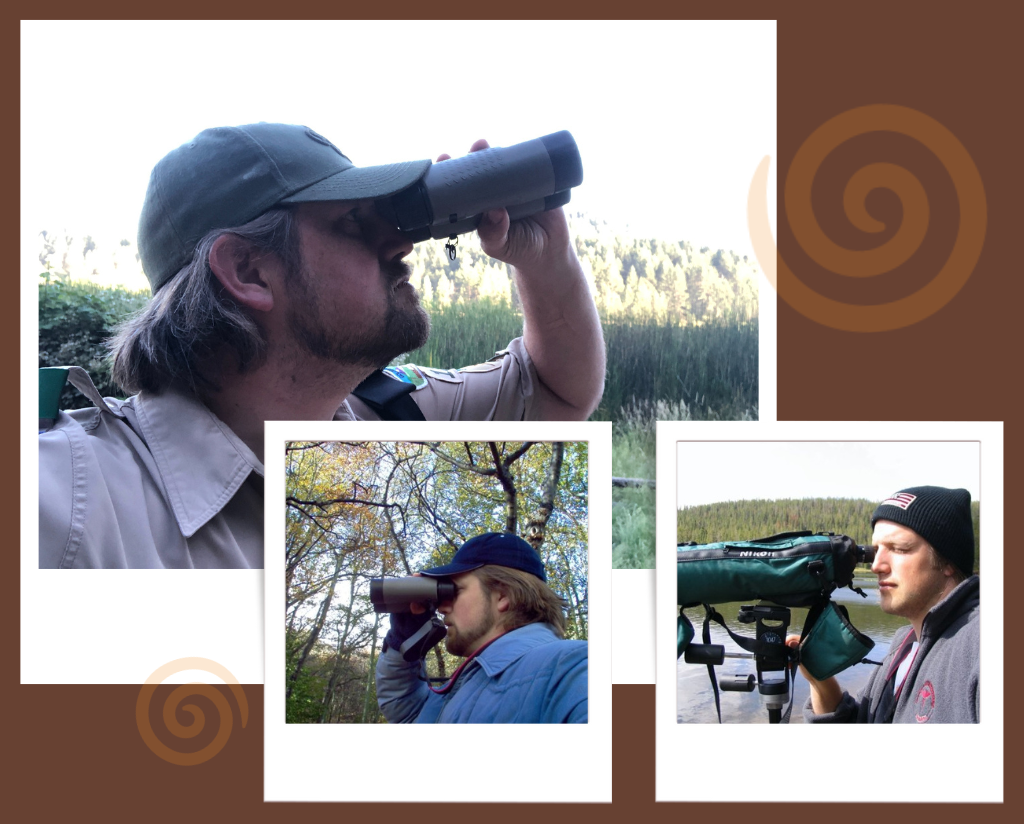Vet school is when most prospective veterinarians begin hearing about crazy dog breeders. You can’t have a conversation about canine reproductive services without the obligatory acknowledgement that the owners of these animals are not normal. That stereotype biases vet students in their formative stages and carries into their later careers. Still today veterinary colleagues will comment on my professional specialty, “I’m sure it’s fascinating work, but aren’t your clients just a bit…touched?”
Crazy is never good and better avoided and therefore many vets avoid even offering reproductive services thinking to weed out some of the more crazy clients. Who wants the headache? I mean, who needs the added drama and stress?
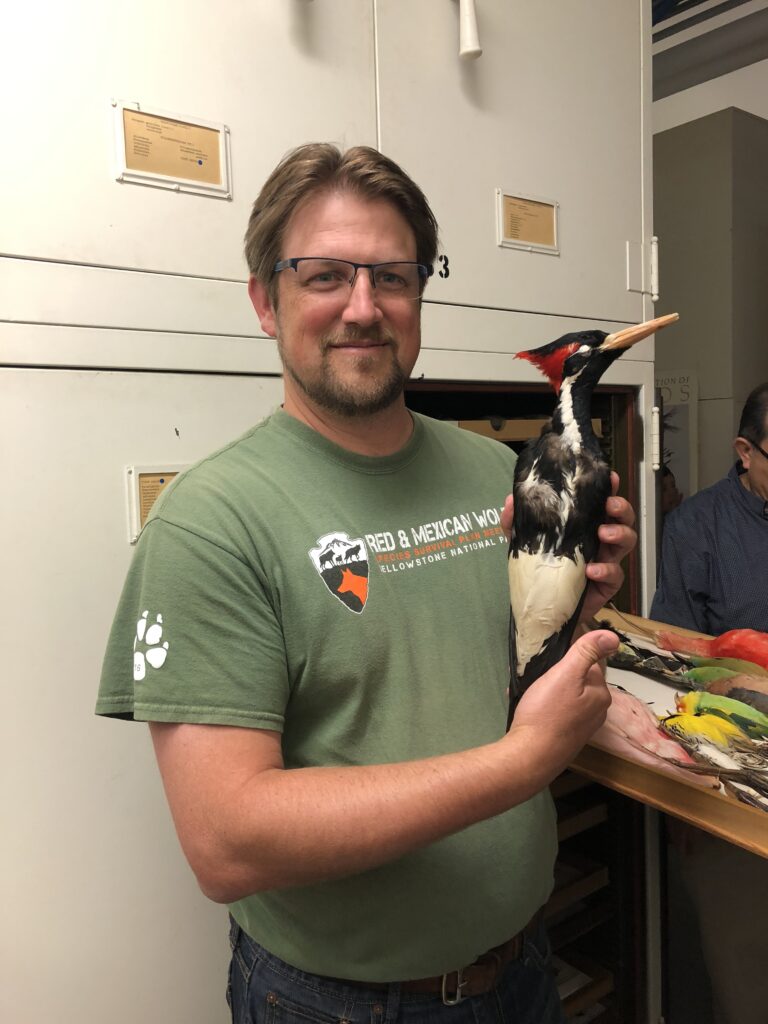
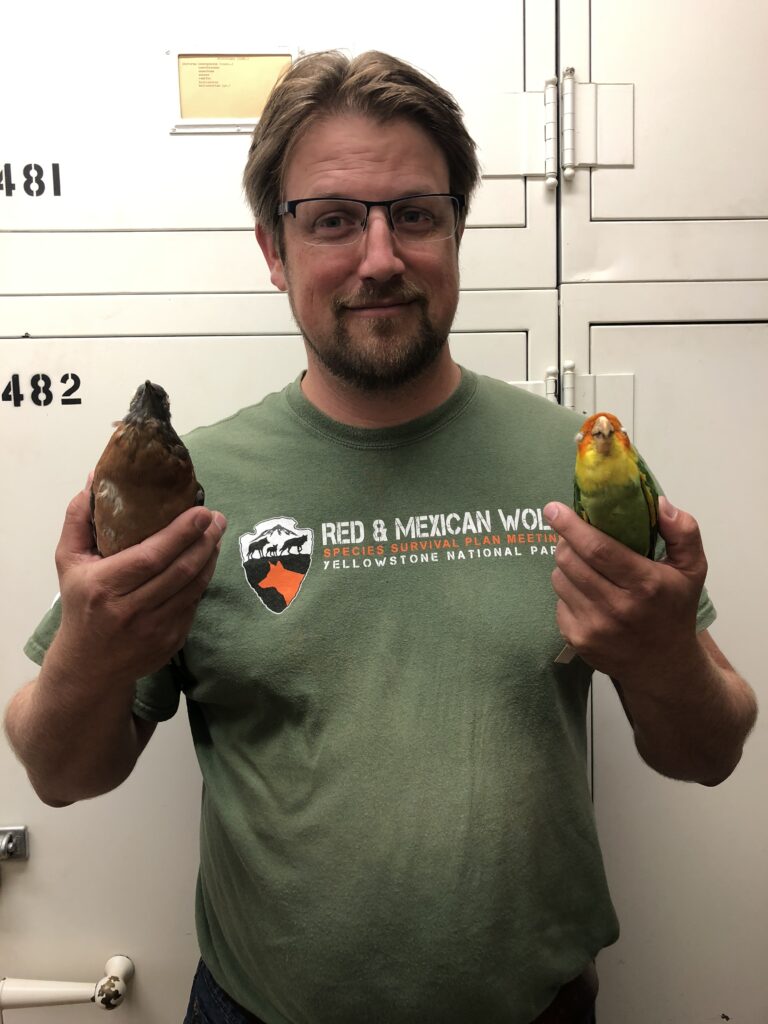
Dr. Christensen at Field Museum in Chicago; when given a behind-the-scenes tour and asked what he most wanted to see in their extensive collection, without question he knew he wanted to see extinct Ivory-billed Woodpecker, Carolina Parakeet, and Passenger Pigeon. Super cool and super sad at the same time.
I’ve thought a lot about this stereotype, especially since my life path has led me to working almost exclusively with dog breeders. The unfortunate part of this misunderstanding is that responsible dog breeders are actually the best of clients. Stick with me and I will defend my opinion.
What do we mean when we say someone is “crazy”? It’s not literal. We don’t think they have a mental illness. I think that most of the time when we say someone is, or a group of people are, crazy, what we mean is that they are passionate about a subject we ourselves don’t care that much about. We don’t understand what the big deal is and why they are getting so excited. We don’t understand it, so they must be “crazy.”


Callum in his Lego room and with a group of Lego friends giving a farewell salute as he headed off to the first day of school this Fall.
But the truth is most of us, by this definition, are crazy. Crazy about something, anyway. I had a college roommate who got so caught up in evolutionary biology that we had to warn girls visiting us, “Don’t ask Max about his major! You’ll be sitting for an hour listening to him go on and on.” And…it was true. Max would get all excited and his volume would rise and his eyes would light up and he’d start spewing a diatribe about phylogenetic trees and monophyletic groups and cladistics and how flight has evolved three times in vertebrate history but only once in insects (which is actually a fun fact for a cocktail party), and…the girls would start out politely listening, but their eyes would increasingly glass over and, realizing that our prospects with these girls were quickly diminishing, finally one of us would say, “Max, none of us have any idea what you’re talking about.” And that would seem to bring Max back to Earth, and he’d laugh at himself, a bit embarrassed, but still feeling the high from his excitement, and certainly not having learned to reel it in next time.
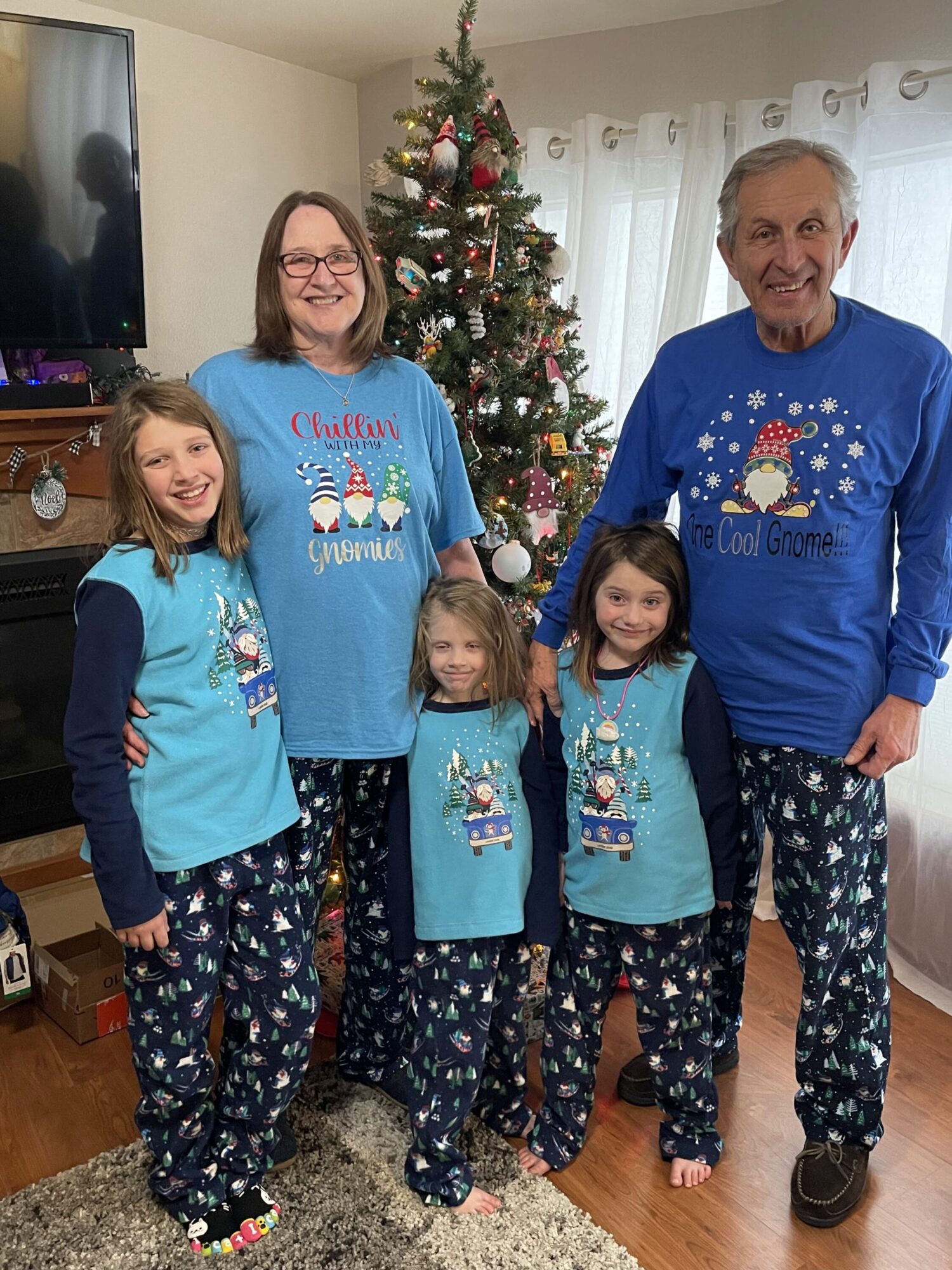

Grammy and Danta with grandkids and some of their winter gnomes (they have different gnomes for every season and holiday).
When I was a university professor and lecturing to veterinary students on canine reproduction, I started by trying to dispel the stereotype that dog breeders are crazy. I told the students that I am a “birder,” someone who loves birdwatching. Most people think birders are “a bit crazy.” And by the definition I’ve given in this blog, we are. I tell the students a story about how I once tiptoed past a momma alligator with baby alligators all over her because I wanted to see a Least Bittern that was down the trail. And then there was the time I drove 6 hours round trip with two strangers and my infant son in the car to a sewage treatment plant in Florida because the three of us (not my son) wanted to see a Masked Duck which normally only lives in the Caribbean but had been blown off course in a storm (and we met people there who had flown in from California to that Florida sewer just to see that duck). Is there a better word than “crazy” to describe us? I have learned that if people ask what I like to do, I tell them I like birdwatching, but then I make myself stop there and do not talk more about it…because I have learned that most people just don’t care. They can’t care. At least not at the level I’m ready to take them to if I start going. They just can’t understand. No one can, except a fellow birder.
Then I asked the students to think about themselves. Do they have a hobby or interest about which they are passionate? Most people have something. And, if they are honest, would their friends and family, who don’t share that interest, describe them as “a bit crazy” when it comes to that thing? I have a fly fishing uncle, a gnome-collecting mom, a board game-playing nephew, a sister who plans to visit all 63 National Parks, a brother-in-law into geocaching and metal detecting, a multi-marathon-running friend, a friend whose young son has turned an entire room in his home into Lego world, and a colleague who collects old cast iron cookware and hangs it in his garage, all of whom would be described by anyone outside their interest groups as “a bit crazy” when it comes to those things. Why do they feel a passion for things that most people don’t give two hoots about? Who knows?
Who even knows?
When they initially encountered the thing, something inside them sparked. I don’t know why I love watching birds but really don’t care to learn to fly fish. I can see why fly fishing would be a great hobby and would give me some of the same peace and calm and endorphin release, but for whatever reason…not interested. So, instead of fishing poles and reels and waders and feathers, I have binoculars and spotting scopes and tripods and bird identification apps on my phone. I have shirts and hats with birds on them. And when I plan a vacation I’m always thinking about what birds I can see there and I plan extra time on the trip dedicated to looking for those birds. My uncle will do the same for fly fishing. My sister will plan her next vacation to southern California, not for Disneyland, but to visit Death Valley, Joshua Tree, and the Channel Islands National Parks (18 down, 45 to go!). And my marathon-running friend, who has made a goal to run a marathon in all 50 states (he’s done 25 so far…halfway there!), will plan his vacation to Connecticut because that’s a state still on his list.

Justus on one of his many marathons (he’s run over 100) and on his way to his goal of one in every state.
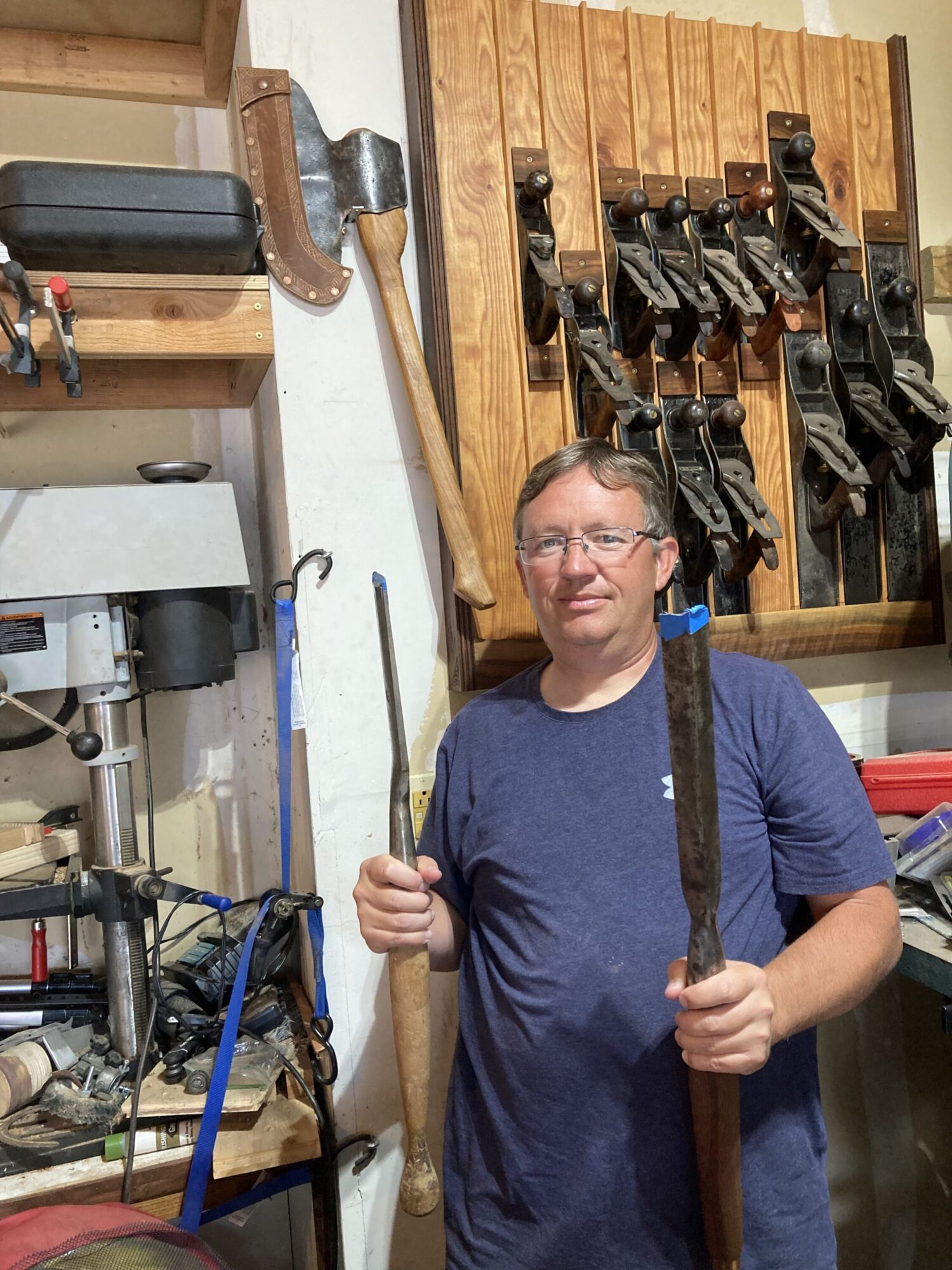
Dr. Christensen’s college roommate, Max, with some of his antique tools: chisels, hand planes, and a formidable axe.

Dr. Christensen’s sister, Pam, with her family at North Cascades National Park, on her way to visiting all 63 National Parks.
Well, dog breeders are the same. They are people who are “crazy passionate” about a certain dog breed.
One of the misconceptions about dog breeders is that they are in it for the money. Some people do breed dogs for money, true. These are the puppy mills, the newest-fashion-Frenchie breeder, and the latest what-breed-can-I mix-with-a-poodle-now breeder. This blog is not about them. For the breeders I’m talking about, the AKC show people, the sporting dog breeders, nothing could be farther from the truth. This is their hobby. Their all-encompassing hobby. They are no more into dog breeding for the money than my uncle is into fly fishing, even if he sells some of the flies he ties. It’s a hobby, not a vocation. For a dog breeder, all of their expendable income is spent on their dogs: clothing, bumper stickers and jewelry featuring the breed, durable crates, show leashes, fancy collars, drool rags, snoods, grooming supplies, Sprinter vans, RVs, portable fences, whelping boxes, puppy playgrounds, veterinarians, trainers, professional handlers, dog show entry fees, kennel club fees, and all the money to travel all over the country showing their dogs. The only money that they recoup is from selling puppies and that does not come even close to offsetting what they put into the dogs.
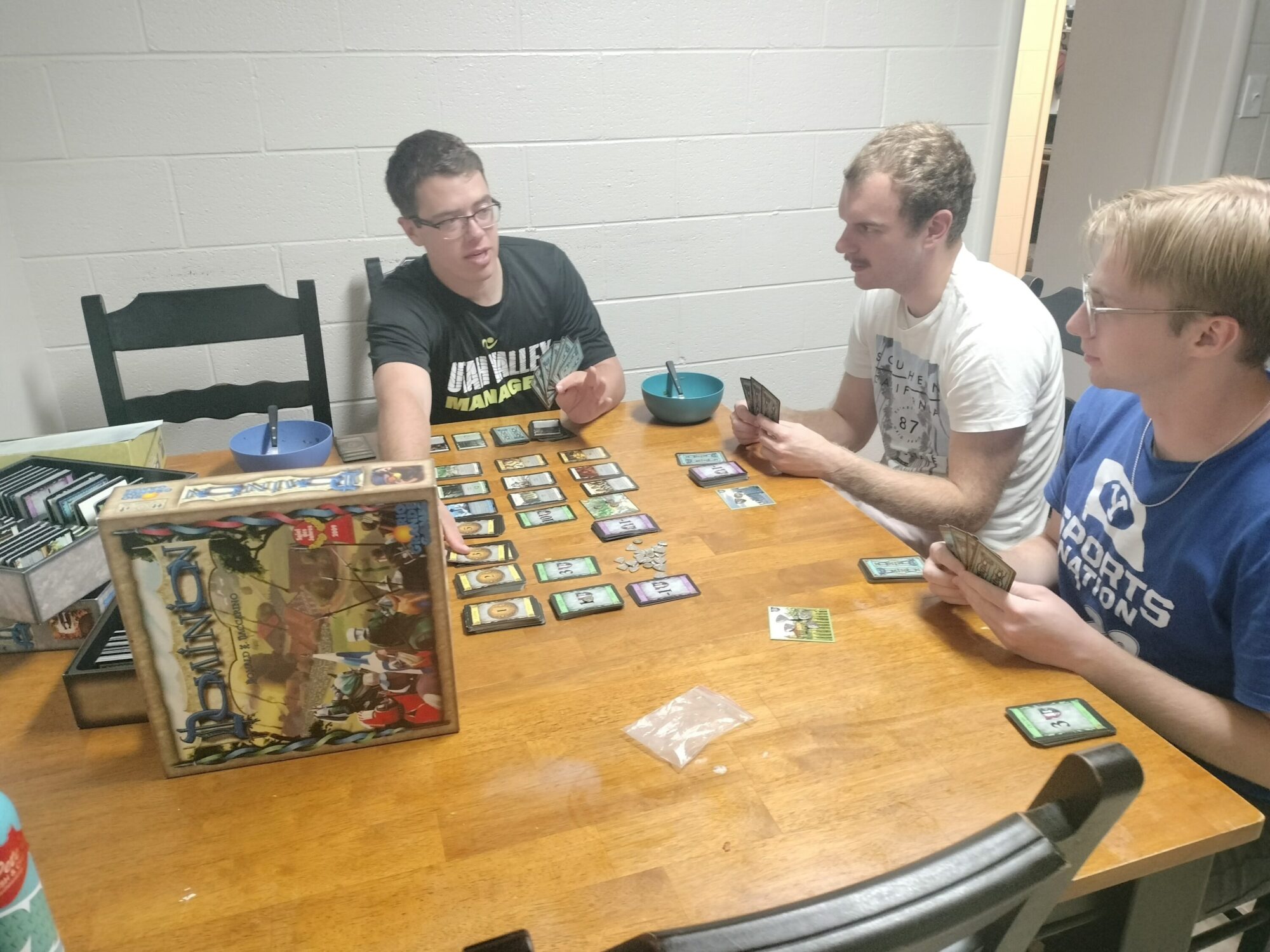
Dr. Christensen’s nephew, Taylor, with some like-minded “crazy” board-gamers.
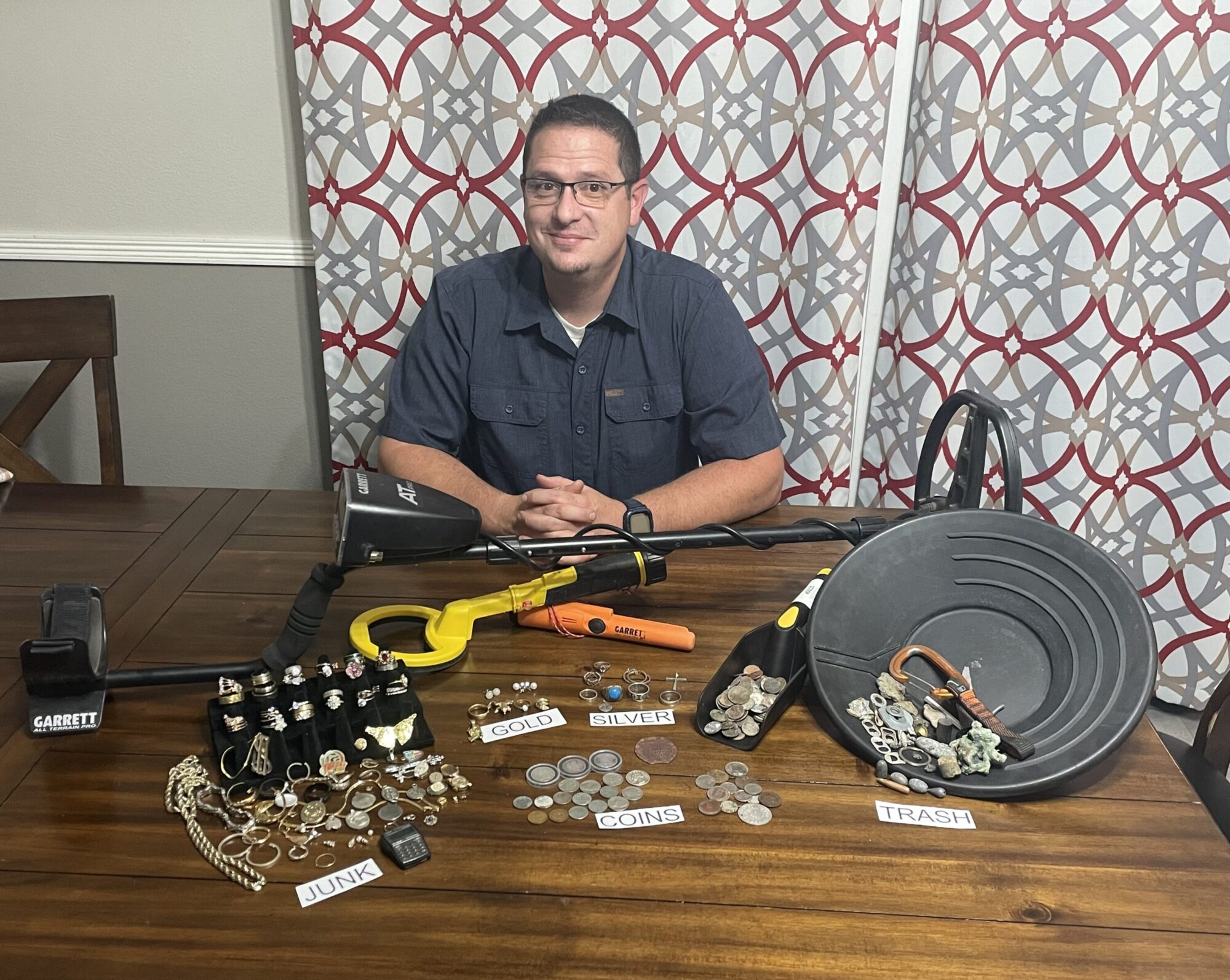
Dr. Christensen’s brother-in-law, Chuck, with a sampling from his treasure chest of metal detecting.
Here’s where I come to why responsible dog breeders are the best clients a vet can hope to have. Vets and good dog breeders share the common goal of canine health first and foremost. Good dog breeders never just want to produce a litter to sell it. Each litter is meticulously planned. The resulting puppies will reflect on the reputation of the breeder and contribute to the overall future and health of the beloved breed. Preliminary health testing is done including hundreds (or thousands) of dollars spent in breed-appropriate health testing of joints and hearts and eyes and endocrine function and breathing ability and genetic screening for diseases. The breeders additionally consider the temperament and conformational strengths and weaknesses of the bitch and then look for a stud dog that compliments the bitch’s strengths and offsets her weaknesses with the goal that the puppies will exemplify the best of both parents and not the weaknesses.
Dog breeders aren’t just passionate about their breed in a broad sense. They are absolutely dedicated to the individual health and happiness of each individual dog. This includes not only those dogs in their direct care, but any that have left their breeding program and are in forever homes elsewhere. The breeders serve as lifelong mentors and resources for the families who adopt their puppies. They are always there to take a puppy back if circumstances warrant it. They participate actively in their breed clubs, many of which fund research into canine health conditions. If one of their dogs needs something medically, they find a way to make it happen.
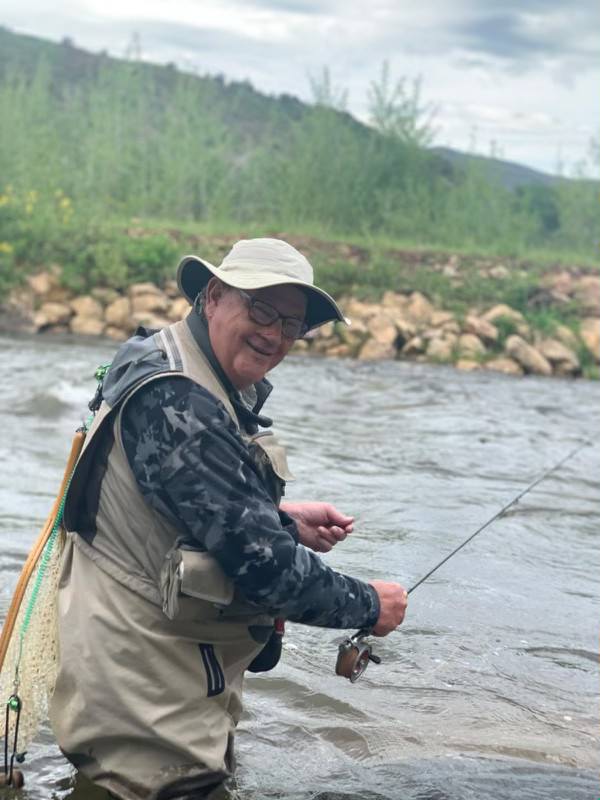
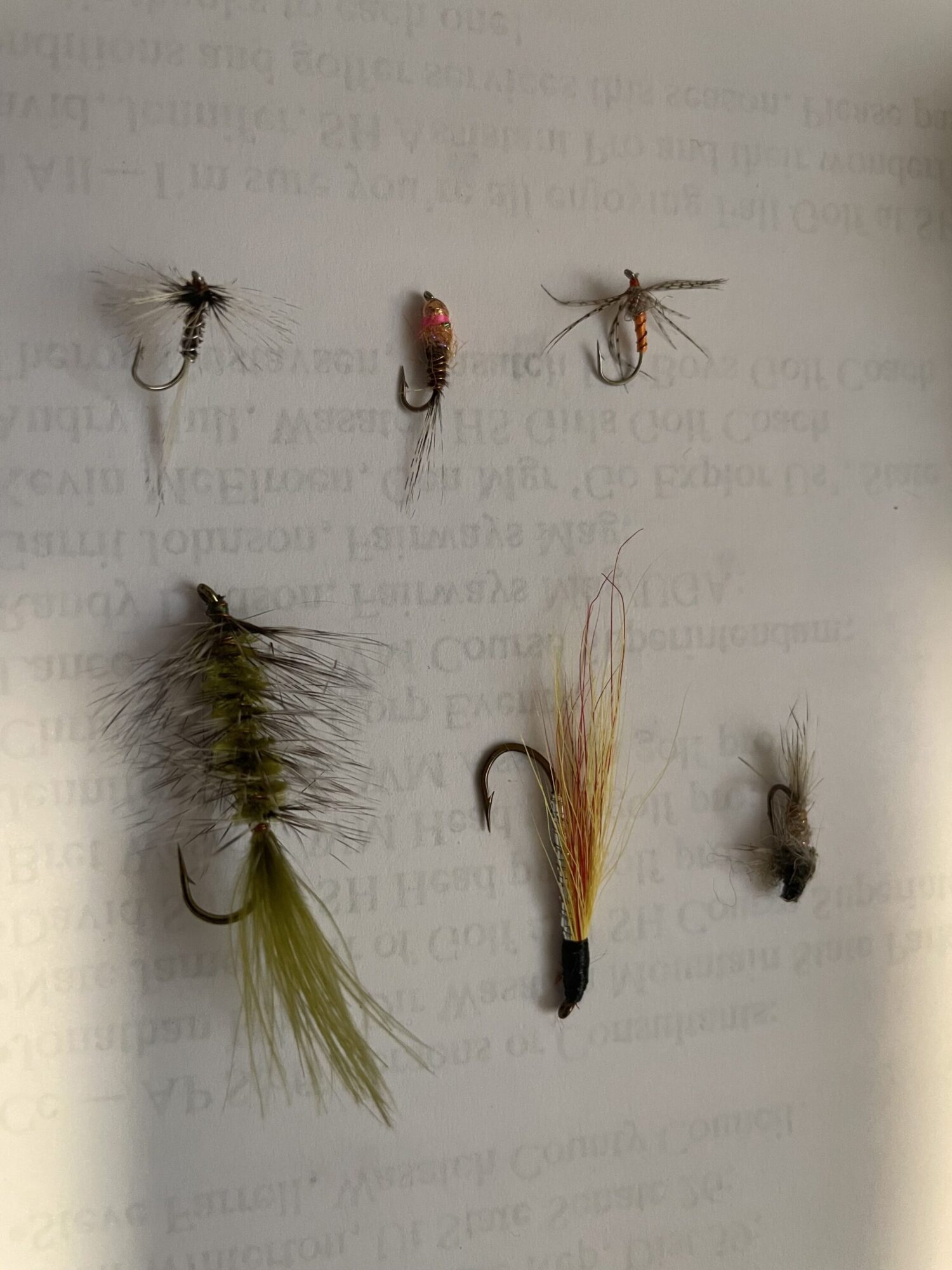
Uncle Mike out fishing and some of his own hand-tied flies. When Mike learned Dr. Bruce was a birder, his immediate request was if he had any interesting feathers for fly-tying…
If we would just say what we mean, this blog topic would never have happened. If we only said, “Oh my goodness, dog breeders are so PASSIONATE about their dogs!” then vet students would gain a totally different, more realistic, truthful, and useful bias that would carry over to better training in school and later service to clients. Hopefully we will get there someday. In the meantime, I hope we can all self-evaluate and identify our own “crazy.” Do you have a room in your basement filled with a diorama of mountains and towns visited by a model train? Do you participate in Civil War reenactments? Renaissance festivals? Comi-Con? Are you a knitter? Quilter? Photographer? Sourdough connoisseur? Or are you, like my college roommate, Max, the youngest member on the board of the “Rocky Mountain Tool Collectors”? In so recognizing our own style of crazy, maybe we can be tolerant, even appreciative, of the crazy in everyone else.
Feel free to comment and tell me: what is your “crazy”?


